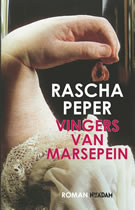Rascha Peper
Marzipan Fingers (Vingers van marsepein)
Queen of subdued passion
Passion is the central theme in Rascha Peper’s work. Whether it is the love of German Romantic painting in Verfhuid (Dyed in the Skin, 2005) or the fascination for the Romanovs in Russisch blauw (Russian Blue, 1995), her protagonists are ready to put their life on the line for passion. The same goes for Vingers van marsepein (Marzipan Fingers), about the lifelike specimens by the eighteenth-century Frederik Ruysch, who specialised in preserving people and animals in alcohol.
The protagonists are Bregtje and Benjamin, both ten years old and separated from each other by three centuries, and yet neighbours, because they live on the same Amsterdam canal. Bregtje is an orphan who is placed with the Ruysch family and Benjamin becomes fascinated by the specimens during a vacation in St Petersburg, where the Ruysch collection – bought by Tsar Peter the Great – ended up in a museum. Both their fascinations stem from the loss of a brother and sister. For Bregtje the promise – false, as it turns out – of being able to meet her brother again is the reason for giving away Ruysch’s secrets. Three centuries later Ben commits a rash deed in the St Petersburg zoo, featuring a rhinoceros – similar to the one that made a deep impression on Bregtje.
Peper seamlessly weaves the two stories into an intriguing whole, cleverly evoking two radically different periods of time through colourful details of daily life, language, and social relations. Both periods come over authentically. Equally convincing is the way Peper voices the experience of two ten-year-old children. All this makes Vingers van marsepein arresting reading.
Publisher
Nieuw Amsterdam
Jan Luijkenstraat 16
1071 CN Amsterdam
TEL. +31 20 570 61 00
FAX +31 20 570 61 99
E-mail: [email protected]
Website: www.nieuwamsterdam.nl
Publishing details
Vingers van marsepein (2008, 316 pp)

Biography
Rascha Peper (b. 1949) made her debut with the collection of short stories, De waterdame (The Water Lady, 1990). She has written numerous novels since, one of which, Rico’s vleugels (Rico’s Wings, 1993), was shortlisted for the AKO Literature Prize. In 1996 she received the Multatuli Prize for her successful book, Russisch blauw (Russian Blue). She is regarded as a writer of carefully crafted books whose construction does not get in the way of a gripping story; readers know her as an accessible and compelling narrator. In 1997 a sizeable volume of her collected short stories was published, and spring 1998 saw the arrival of her novel Een Spaans hondje (A Spanish Dog). In 1999 the novel Dooi (Thaw) appeared, followed in 2003 by the ambitious novel Wie scheep gaat (Embarkation). In 2005 Peper published the novella Verfhuid (Dyed in the Skin).
Dossier
Quotes
Rascha Peper’s great strength is the matter-of-course manner in which she presents bizarre subject matter and symbolic motifs. A great story-telling talent.
De Volkskrant
A compelling book full of delicious details about seventeenth- century Amsterdam. […] Rascha Peper proves again that she is a talented writer, a full-blooded storyteller with the gift of being able to take her readers into the colourful worlds she creates.
De Telegraaf
Again Peper has delivered a feat of beautiful and entertaining writing.
NRC Handelsblad
